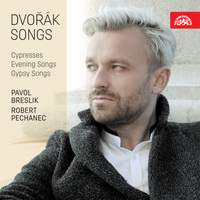Interview,
Pavol Breslik on Dvořák Songs
 Equipped with a distinctively beautiful lyric voice with just a hint of steel, the Slovakian tenor Pavol Breslik first caught my ear as Tamino on Simon Rattle's Zauberflöte from Baden-Baden (I went so far as to describe him as 'the Mozart tenor of dreams' in my review of the DVD!) and I've followed his career with interest ever since: his 2016 collection of Mozart opera arias and lithe, wide-eyed Schöne Müllerin have numbered among my favourite solo vocal discs of the past couple of years, and his new collection of Dvořák songs (out last month on Supraphon) looks set to join them as a permanent fixture on my playlist. (I'm crossing my fingers that his Wigmore Hall debut, scheduled for July 2018, will give me the chance to experience him live in this repertoire!)
Equipped with a distinctively beautiful lyric voice with just a hint of steel, the Slovakian tenor Pavol Breslik first caught my ear as Tamino on Simon Rattle's Zauberflöte from Baden-Baden (I went so far as to describe him as 'the Mozart tenor of dreams' in my review of the DVD!) and I've followed his career with interest ever since: his 2016 collection of Mozart opera arias and lithe, wide-eyed Schöne Müllerin have numbered among my favourite solo vocal discs of the past couple of years, and his new collection of Dvořák songs (out last month on Supraphon) looks set to join them as a permanent fixture on my playlist. (I'm crossing my fingers that his Wigmore Hall debut, scheduled for July 2018, will give me the chance to experience him live in this repertoire!)
Our friends at RSK Distribution have kindly granted us permission to share this interview which he gave to the label about the new recording, which broaches the challenges of singing in Czech, the role of song repertoire in his career to date, and some tantalising hints regarding future recordings…
Photo credit: Anton Karpita
Your new Supraphon album presents some of Antonín Dvořák’s songs. What position do songs occupy in your repertoire?
I began devoting myself to songs back at the time of my studies at the conservatory in Žilina, where I performed the Gypsy Songs for the very first time. I then succeeded with a similar repertoire at the Antonín Dvořák International Vocal Competition in Karlovy Vary, where I received a prize in the song category. I have the feeling that songs have always been of great importance for us, the “Czechoslovaks”, so at all times I have treasured songs in my heart.
The album features songs from the Cypresses, the Evening Songs and the Gypsy Songs. How did you choose the tracks?
The Gypsy Songs came up naturally; as I have said, I have been singing them for a long time. The pianist Robert Pechanc and I have performed them for years. The Evening Songs were new to me, or to be precise, it was the first time I had sung them. And when it comes to the Cypresses, I was scheduled to perform them once previously, at the “Dvořák marathon” in Ostrava, yet I had to cancel my appearance owing to having fallen ill. Robert Pechanec played the cycle there, and he was intrigued by it, so we agreed that it would be great to record the work. I think that there are actually very few recordings of the Cypresses. I confess that initially I deemed it audacious that I, as a Slovak, would venture into Dvořák’s songs, but I said to myself that I would throw a stone into the river and see what ripples it would make.
What was it like singing in Czech?
I have to say that Czech is harsher than Slovak, and foreign singers will never be able to conceal their accent. Yet the most interesting aspect when working with the Czech language was the accentuation of words in the Cypresses – we should bear in mind that it was Dvořák’s very first song cycle. That is one of the reasons why we invited the Czech music director Jiří Gemrot along to take part in the recording.
Throughout your career, you have very neatly combined opera and song. The singer should take different approaches to the two disciplines. How have you succeeded in this respect?
The main difference rests in the fact that when performing songs the singer is only accompanied by a pianist on stage, thus being naked. The audience merely focus their attention on the two performers, who have to be in perfect harmony, have to come across as a single brain and a single breath. On the other hand, should any difficulties arise during an opera production, you can always hide behind a prop, or somehow camouflage your indisposition, whereas it is simply out of the question when performing songs.
You have appeared at the world’s most prestigious opera houses, including those in New York, London, Vienna and Munich. Do you have any time left to come back home to Slovakia?
I always strive to go back there, at least for a short time, to sleep in my own bed for one night or two. I know that is not enough, yet I firmly believe that I will have the opportunity to spend more time in Slovakia.
Can you reveal what your next recording project will be ?
There is a lot of music out there I would like to record. At the moment, I am in an album-making period; the next project will be a recording of Eugen Suchoň’s songs with orchestra in Bratislava, followed by a recording of Richard Strauss’s songs, also with orchestra.
Pavol Breslik's collection of Dvořák songs was released on Supraphon on 21st April.
Available Formats: CD, MP3, FLAC
Recent and related recordings from Pavol Breslik
Dvořák: The Spectre's Bride
Simona Šaturová (soprano), Pavol Breslik (tenor) & Adam Plachetka (bass-baritone)
'Meister, one of Germany’s rising conductors, makes a strong case for [the work]...Pavol Breslik’s lyric tenor expands into the Spectre’s strenuous music.' (Sunday Times)
Available Formats: CD, MP3, FLAC
'Breslik’s warm, smooth voice is well suited to Mozart, and he has stage experience of almost all the roles recorded here, at Covent Garden, Munich and other major houses.' (Opera)
Available Formats: CD, MP3, FLAC, Hi-Res FLAC
'Breslik has done nothing better than this beautiful recording...this is immaculate lieder singing, as much about the text as the melodic line.' (The Guardian)
Available Formats: CD, MP3, FLAC






